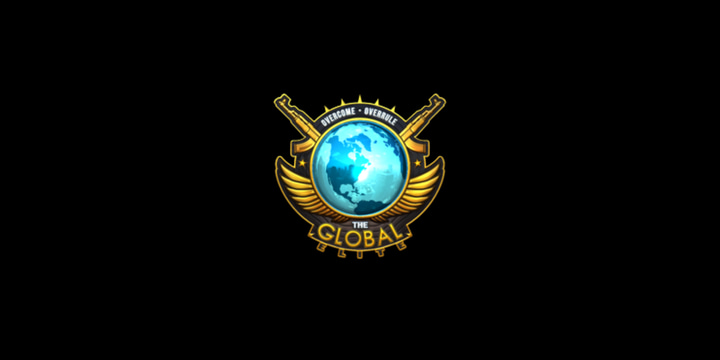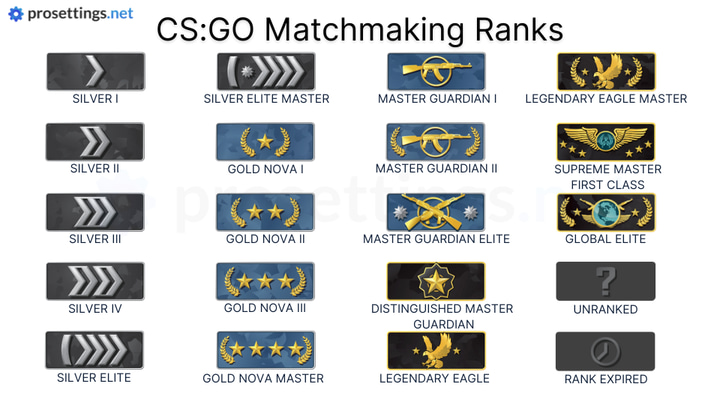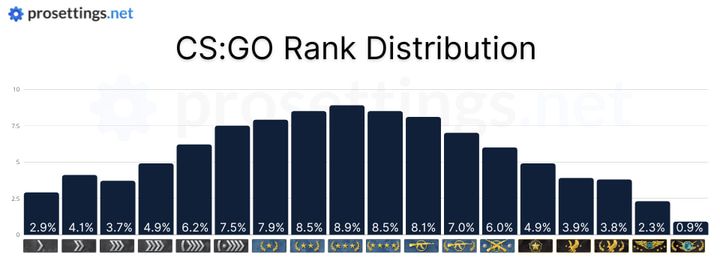CS:GO Ranks – Explaining the Ranking System

Counter-Strike: Global Offensive has, like many other competitive games, a built in ranked mode where you get to compete against other players in 5v5 matches. After your first ten matches in the competitive mode of the game you get a matchmaking rank to show you where you stand against the rest of the game’s population.
In this article, we’ll answer any questions you might have about the way CS:GO ranks players, as well as show you a CS:GO rank distribution so you can find out how you stack up against the rest of the population.
Ranks in CS:GO

CS:GO ranking system hasn’t changed since the very beginning of the game’s competitive mode. There are 18 ranks in total, ranging from Silver all the way up to Global Elite. When discussing on forums or social media, people often use CS:GO rank abbreviations. We’ve added those in brackets so you can always know what rank people are talking of.
- Silver I (S1)
- Silver II (S2)
- Silver III (S3)
- Silver IV (S4)
- Silver Elite (SE)
- Silver Elite Master (SEM)
- Gold Nova I (GN1)
- Gold Nova II (GN2)
- Gold Nova III (GN3)
- Gold Nova Master (GNM)
- Master Guardian I (MG1)
- Master Guardian II (MG2)
- Master Guardian Elite (MGE)
- Distinguished Master Guardian (DMG)
- Legendary Eagle (LE)
- Supreme Master First Class (SMFC)
- Global Elite (GE)
Note that you can also encounter players who don’t yet have a rank (or have their rank expired).
CS:GO Rank Distribution

Valve doesn’t give out any official ranking distributions, but there are of course a number of websites and surveys out there that try to find out how the ranks are distributed among the competitive population. We’ve taken some of those surveys and websites and averaged them out so you can get an idea of the average CS:GO ranks.
Obviously these numbers can fluctuate a bit over the months and years, but from our experience there aren’t really any massive shifts in the overall population in the different ranks. Valve did change the way ranks are calculated somewhere in 2016 (which caused most players to go down a couple of ranks, leading to the overall rank distribution that we see now) and again in early 2022, but aside from that this distribution should work out correctly.
How do I rank up in CS:GO?
No one knows exactly how Valve’s matchmaking and ranking system works, so it’s no of use trying to game this system by applying a bunch of ‘tips and tricks’ in order to rank up.
In general, you should be able to get to the high Gold Nova ranks with relative ease if you dedicate enough time to practicing your basic CS:GO skills, but everyone is different so we’re not going to go out on a limb here and say ‘players in rank X need to work on Y and Z to get out of said rank‘ since these things are different for each individual player. If you want to brush up on your knowledge we can point you to our CS:GO guides on our blog.
If you ask us, it’s best to focus on your improvement as an individual. Your rank is just a symbol, after all. If you improve as a player, your rank will improve with you after a while.
We know that this isn’t the bite sized answer you were perhaps looking for, but the fact is that no one really knows how Valve calculates your actual rank and which stats are used to give you your rank so it’s useless to try and game the system. Don’t be that guy who absolutely prioritizes getting kills over anything else because someone said your kill/death ratio is one of the most important factors for ranking up. Again: focus on being the best player (and teammate) that you can be and you’ll naturally rank up over time. If you feel stuck it can also be a great idea to have someone analyze your stats or a replay of one of your matches.
What is a good CS:GO rank?
If we look at the rank distribution, you need to be at least Master Guardian I in order to be in the top 33% of players.
What is considered ‘good’ depends on your personal definition of the word (some people don’t even consider some lower tier pros to be ‘good’!) but we see being better than almost 70% of active players to be a good starting point for calling yourself ‘good’.
Rank decay in CS:GO
After losing your rank due to inactivity, your rank will start to decay. The longer you don’t play, the lower your rank goes. If you don’t play for 29 days you will find that your rank hasn’t changed much (or at all) but if you don’t play for months on end you will notice that your rank has dropped considerably.
What rank are CS:GO pros?
Due to the fact that CS:GO pros don’t often play matchmaking (instead they scrim against other teams on community servers, or use platforms such as FaceIt and ESEA for pugging, which also use community servers) their ranks wildly vary. Some pros who haven’t touched matchmaking in years might even be around Gold Nova.
Of course any active pro could easily get to Global Elite if they want to, but the reality is that a lot of professional players don’t play on Valve’s official matchmaking servers.
What is the average CS:GO rank?
The average CS:GO player is Gold Nova 3.
A little over a third of all competitive players are ranked somewhere between Gold Nova 1 and Gold Nova 4. If we look at the percentage of players in the Silver ranks, we can conclude that, if you are Master Guardian or higher, you are in the top 33% of active CS:GO players.
How many games does it take to get a rank in CS:GO?
You have to win 10 games in order to get your first competitive rank. Note that you will only be able to play 2 competitive games a day if you’ve never earned a rank. Once you have achieved your first rank, you can play an unlimited amount of games.
How long until your CS:GO rank disappears
Your rank will disappear (‘become inactive’) after 28 days of not playing. You will then need to win a game in order to get your rank back.
What ranks can play together in CS:GO?
There can be a maximum difference of 5 ranks between the highest and the lowest ranked player when queuing together. If you five stack (queue with 5 people) this does not apply.


